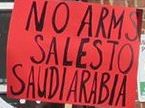Canada’s Production and Sale of Armaments
— Steve Rutchinski —
Canada’s integration into the U.S. war machine and economy is an issue that concerns all peace- and justice-loving Canadians. The large scale production, export and use of armaments by the U.S. and its allies including Canada must be opposed in the interest of peace.
 In 2018, Canada became the second largest arms exporter to West Asia — Saudi Arabia specifically — surpassed only by the United States. Canada’s elevated status as an arms merchant to that region is due mainly to a $15 billion contract by General Dynamics Land Systems of London, Ontario to provide Saudi Arabia with light armoured vehicles. The $15 billion Saudi Arabia arms deal catapulted Canada to the rank of second biggest arms exporter to West Asia and sixth in the world overall, according to Jane’s Defense Weekly. The arms contract, broadly opposed by Canadians, was negotiated when Stephen Harper was Prime Minister. Upon coming to power, the Trudeau government had the power to cancel the deal yet decided to confirm it, cynically declaring it is not good to go back on a done deal, and “if we don’t do it someone else will.”
In 2018, Canada became the second largest arms exporter to West Asia — Saudi Arabia specifically — surpassed only by the United States. Canada’s elevated status as an arms merchant to that region is due mainly to a $15 billion contract by General Dynamics Land Systems of London, Ontario to provide Saudi Arabia with light armoured vehicles. The $15 billion Saudi Arabia arms deal catapulted Canada to the rank of second biggest arms exporter to West Asia and sixth in the world overall, according to Jane’s Defense Weekly. The arms contract, broadly opposed by Canadians, was negotiated when Stephen Harper was Prime Minister. Upon coming to power, the Trudeau government had the power to cancel the deal yet decided to confirm it, cynically declaring it is not good to go back on a done deal, and “if we don’t do it someone else will.”
The U.S. is Canada’s largest market for armaments exports. Project Ploughshares estimates that 60 per cent of Canada’s armament shipments go to the United States. Despite its obligations under the Arms Trade Treaty, Canada does not report the value of armaments sales to the U.S. The non-reporting of sales to the U.S. is itself an indication of Canada’s integration into the U.S. war machine and economy.
Global Affairs Canada did report in 2017 the export of more than $1 billion in military goods and technology to countries other than the U.S. with 48 per cent of those sales going to Saudi Arabia. After the U.S., NATO members (UK, Germany, France, Netherlands and Norway) are traditionally the largest market for Canadian armaments exports. NATO member countries, including Canada itself, have used Canadian armaments in wars of aggression against Yugoslavia, Libya, Iraq and Syria.
A grave concern to many Canadians is a report by the all-party Standing Committee on National Defence (in the House of Commons) called Canada and NATO: An Alliance Forged in Strength and Reliability, tabled in June 2018. The report notes with regret the low amount of Canadian armaments sales to NATO countries and calls for public funds to be given to the big armaments producers operating in Canada “to secure a bigger share.”
 The all-party report says that Canadian armaments and parts manufacturers registered with the NATO Support and Procurement Agency (NSPA) in 2016 numbered only 700 out of 65,000 such companies and received only one per cent of NATO contracts in 2017. The report says the federal government, in line with its new defence policy, should more aggressively make it possible, by subsidizing and providing other concessions, for the Canadian armaments industry to secure a bigger share of NATO weapons contracts.
The all-party report says that Canadian armaments and parts manufacturers registered with the NATO Support and Procurement Agency (NSPA) in 2016 numbered only 700 out of 65,000 such companies and received only one per cent of NATO contracts in 2017. The report says the federal government, in line with its new defence policy, should more aggressively make it possible, by subsidizing and providing other concessions, for the Canadian armaments industry to secure a bigger share of NATO weapons contracts.
Of note as well, in 2017 Canada shipped armaments to 11 countries involved in aggressive wars or human rights abuses, not least of which was the United States. The U.S. is currently involved in active wars in Afghanistan, Iraq, Syria, Yemen, Somalia, Libya, Nigeria and throughout West Africa, and in countless unreported Special Operations and drone attacks around the world.
In this election, the MLPC urges Canadians to take a stand against the production and sale of armaments in Canada that are used for aggression, war and the suppression of people fighting for their rights.
Let us speak out against Canada’s integration into U.S. Homeland Security, its wars of aggression and war economy.
Canada Out of NATO and NORAD!
Canada Needs an Anti-War Government!
Make Canada a Zone for Peace!
Steve Rutchinski is the MLPC candidate in the Toronto riding of University–Rosedale.


